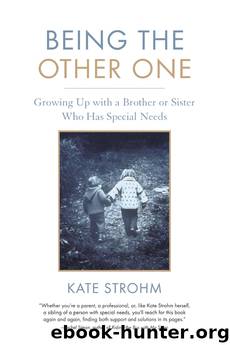Being the Other One by Kate Strohm

Author:Kate Strohm
Language: eng
Format: epub
Publisher: Shambhala
TALK WITH OTHER RELATIVES AND FRIENDS
Try to talk to other people who are closely involved in your life. Aunts, uncles, other extended family, or friends can support you. The more social support that is in place, the easier it is to cope with ongoing stresses.
During the initial stages of my group therapy, I talked to a cousin who had shared large parts of my childhood with me. For the first time I discussed my fears, panic attacks, and therapy. As I spoke with him, I was in a knot the whole time, and for some time afterward, I felt guilty and anxious. I still felt that I shouldn’t have talked with him about such things. I worried that I was betraying my parents and my sister and feared that my cousin would think that I was just looking for attention. We talked later on the phone—he didn’t sound surprised or disapproving, just interested and eager to help.
Reaching out to another person and confiding my feelings was one of the most difficult feats I have ever managed. It was also the first step in breaking down the isolation and moving toward self-acceptance.
If you are still at school, initiate discussion with teachers or a school counselor. They may know of other siblings in your school. They may have suggestions for services that could help you find support and create networks.
TOWARD THE FUTURE
Caring for a Brother or Sister
You may not have a close relationship with your brother or sister with special needs. Try not to feel guilt about that. The development of the relationship will have depended to a large extent on the special needs of your brother or sister and how your family dealt with the situation. If you were abused as a child, you have the right to walk away if that is what is necessary to protect your life or sanity. Lenore, who lived in fear of her brother for most of her childhood, says:
My experience, I hope, isn’t common, but one of the things that can make me feel very alone is the “Oh, of course I will care for my sibling no matter what” pressure, and the loneliness of having stepped outside the Good Sibling Caretaker category and become the Bad Sibling who says: “No, my life and sanity will not be sacrificed; I have done what I could in seeing my brother placed in a good facility, but I will not be pressured to go further.”
If you haven’t already done so, talk to your parents about their expectations for the future. Think about the role you will play and let them know at what level you wish to be involved. Show them the sections in chapter 10 that deal with such issues as guardianship and estate planning. Encourage them to create a file with all the necessary information about your brother or sister.
You can gain practical support from a range of people, both within and outside your family. It is crucial to have support from service providers who work with your brother or sister.
Download
This site does not store any files on its server. We only index and link to content provided by other sites. Please contact the content providers to delete copyright contents if any and email us, we'll remove relevant links or contents immediately.
Rewire Your Anxious Brain by Catherine M. Pittman(18657)
Talking to Strangers by Malcolm Gladwell(13374)
The Art of Thinking Clearly by Rolf Dobelli(10490)
Mindhunter: Inside the FBI's Elite Serial Crime Unit by John E. Douglas & Mark Olshaker(9345)
Becoming Supernatural by Dr. Joe Dispenza(8222)
Change Your Questions, Change Your Life by Marilee Adams(7786)
Nudge - Improving Decisions about Health, Wealth, and Happiness by Thaler Sunstein(7710)
The Road Less Traveled by M. Scott Peck(7604)
The Lost Art of Listening by Michael P. Nichols(7507)
Mastermind: How to Think Like Sherlock Holmes by Maria Konnikova(7350)
Enlightenment Now: The Case for Reason, Science, Humanism, and Progress by Steven Pinker(7315)
Win Bigly by Scott Adams(7201)
The Way of Zen by Alan W. Watts(6617)
Daring Greatly by Brene Brown(6515)
Big Magic: Creative Living Beyond Fear by Elizabeth Gilbert(5777)
Grit by Angela Duckworth(5616)
Ego Is the Enemy by Ryan Holiday(5452)
Men In Love by Nancy Friday(5242)
The Laws of Human Nature by Robert Greene(5211)
